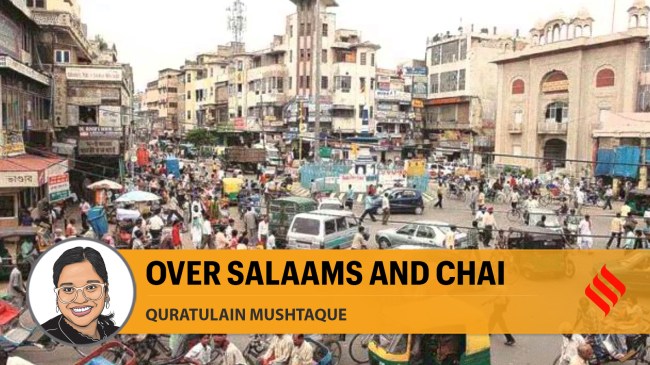Opinion Who’s my neighbour: Chai, ‘salaams’ and my mother’s lessons in community
My mother’s network of meticulously maintained relationships has saved us in ways big and small: From a steady supply of utensils and freezer space during Eid to spare bedding and even an extra room to isolate in during the Covid-19 pandemic
 Sometimes I think of these bonds as invisible threads connecting generations of women in migrant families, especially in Delhi, a city of arrivals. Partition survivors in Old Delhi, traders from small towns, nurses from the South.
Sometimes I think of these bonds as invisible threads connecting generations of women in migrant families, especially in Delhi, a city of arrivals. Partition survivors in Old Delhi, traders from small towns, nurses from the South. I have always considered Delhi as my forever temporary home. My parents moved here in 1998, three years after my birth, and I grew up in a string of houses — two owned, the rest rented. What has stayed with me through all those moves is the quiet art of my mother, Rabia, of building bonds that last far longer than any tenancy agreement.
My life and work have allowed me the joy and company of many neighbours in different cities, but the neighbours of what I call home — Delhi — are familiar to me only because of my mother. In a city that left her feeling lonely when her husband and children left for work and school each day, she built her own community with the people sharing our walls, windows, and balconies. A delicate girl married into a tough household, Rabia had to shuffle and shuttle between homes and mindsets. A dutiful wife, she followed her husband’s decisions to change residences — dictated by financial needs — without complaint. For her, each move meant starting over. For the rest of us, there was continuity in our schools and jobs; for her, there was only a quiet reinvention.
But strangeness never scared her. She faced the indifference of a city that treats migrants as outsiders and still managed to carve out a space for herself. She has always been the first to open her doors to neighbours. Often, I would come home to find her sipping tea with new neighbours. “This is Saima aunty, from Deoband. Her daughters are Yumnah, Aamna, and Razia. Say your salaam,” she would say, like a careful archivist of relationships. Over time, she would map the invisible geography of our lanes for us — who lived where, who was also from our hometown in Bihar, what their stories were, how to greet them, what mattered to them.
Her network of meticulously maintained relationships has saved us in ways big and small: From a steady supply of utensils and freezer space during Eid to spare bedding and even an extra room to isolate in during the Covid-19 pandemic. India is a congested country, where space is always tight, and neighbours become extensions of family. It is a truth summed up in the phrase chhajje-chhajje ka pyaar. But this pyaar transcends the binaries of coupledom. It resides in the quiet camaraderie and lively gatherings of women who bring the ethos of a tapri to their roofs and balconies — the only public space that most housewives in urban settings are allowed by the politics of space. While managing a household that rarely left her time to comb her hair, my mother created a sisterhood that supported her through financial struggles, endless domestic routines, and the quiet loneliness of a full house.
During school breaks, when chores eased a little, I would watch her lean over the balcony, chatting with other women in voices that carried down the street. We would scold her, “Kya poore mohalle ko sunana hai?” without realising that she belonged to that mohalla in a way we never would. We were visitors in our own neighbourhood. She was the linchpin, the heart people knew and loved.
Sometimes I think of these bonds as invisible threads connecting generations of women in migrant families, especially in Delhi, a city of arrivals. Partition survivors in Old Delhi, traders from small towns, nurses from the South, young brides like Rabia from far-off villages and small towns, and families like ours pulled here by work. In a city that prides itself on ambition but often forgets kindness, these women have turned neighbourliness into a way of survival. My mother is part of that long, quiet history — the kind rarely found in archives but written in tea stains on balcony ledges and the soft “salaams” exchanged on stairwells.
We have moved again to another rental home, but her ties remain. Calls still come from old neighbours, missing her and eager for her return. Knowing my neighbours through my mother has been my quiet training in community — how to show up for people and hold space for them, even when the city refuses to make space for you.
It is this quiet training I carried with me when I moved to Oxford for higher education, where I became the neighbour who gathered people at 25 Wellington Square for chai and dinner daawats. Over adrak chai and steaming bowls of biryani, we would trade stories of home, discovering unexpected commonalities, like pieces cut from the same cloth. Now, back in the world of my mother’s mohallas, I am proud to carry my relationships beyond the validity of my visa. The friends I shared sorrows and laughter with over endless cups of chai are now family. These gatherings taught me that community isn’t about geography or permanence; it’s about the simple, generous act of opening your door and saying, “Come in.”
The writer is a development sector professional who works on social and economic empowerment for women






